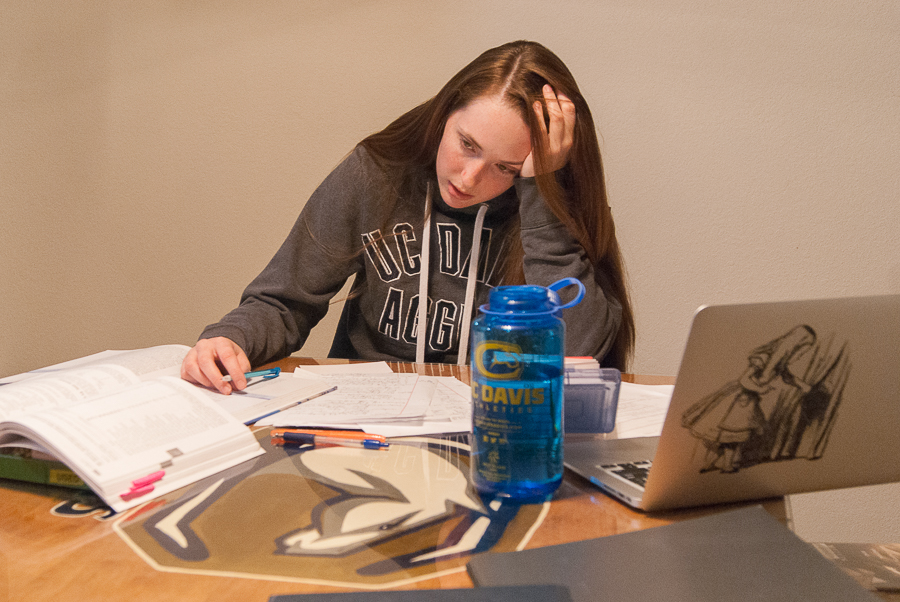
How much is too much?
To most students, finals season is understood to be a dreaded time plagued by all-nighters, excessive periods of time spent at the library and copious intakes of caffeine. High levels of stress cause many students to experience mental and physical health deterioration during this time, but few students acknowledge and address the issue.
Shrishti Tyagi, a third-year biological sciences major and a team coordinator for the Mental Health Initiative, attributes students’ overwhelming stress levels to the overly-competitive environment created for students attending a renowned research university.
“I think as a UC school it’s very competitive in general, and a lot of students are not only doing academics, they’re also working part-time, they’re in clubs, they’re doing research,” Tyagi said. “I think it’s just the stress of everything else we do in our lives, and all of it adds up. Finals week is just kind of that build-up where you have to be able to balance everything out and make sure you’re still doing well.”
According to Catrina Chan, a fourth-year psychology major and a former member of the Student Health and Wellness Committee of ASUCD, students’ unwillingness to acknowledge their stress-induced physical or mental health issues and seek out help derives from their lack of knowledge of the different services and resources that were specifically made to help students deal with stress.
“I think that it’s a lack of knowledge of all the resources that we have on campus,” Chan said. “Even I’ll admit, I’m in my fourth year now, and there were resources that I did not know about until Winter Quarter last year. We have the counseling center, the mind spa, the nap map, the hammocks in the quad and massage chairs in the Women’s Research Center.”
Maria Navarro, a third-year Chicana and Chicano studies major, places societal norms at the root of the problem, saying that in today’s culture, admitting that you need to seek out help for any matter is heavily frowned upon.
“I think it has to do with societal norms and how we’re not really used to seeking out help,” Navarro said. “Growing up, we don’t realize that it’s okay to ask for help. Sometimes it takes so much to get to a certain point where you can feel comfortable doing so.”
Many would argue that we live in a culture that glorifies mental and physical health decay when it comes to academics. All too often, we see or hear students trying to outdo one another in terms of who has a heavier workload, who is more stressed out or who has had the least amount of sleep. According to Tyagi, this type of mentality has become ingrained into students’ minds to the point of normalization.
“I think there’s that notion of ‘if you study more, you’re a better student,’ which I don’t think should be the case,” Tyagi said. “I think it’s so in-built now that even someone like myself doesn’t realize when I do it. It’s such a norm to [say] ‘I had two hours of sleep and I’m on my fifth cup of coffee right now.’”
This process of normalization starts early on in students’ academic careers and resonates with them through college, according to Shreya Deshpande, a second-year cognitive science and sociology double major and a staff member of the Mental Health Initiative.
“When students prepare for [the] college admissions process, it’s a competitive environment,” Deshpande said. “This competitive mentality carries through college and it translates into students thinking that the more work they do, the more they’re valued as a student, which causes them to make these sacrifices.
Deshpande believes that while it may be difficult to completely eliminate this toxic mentality from students’ minds, there are steps that can be taken to help prevent students from succumbing to it.
“Talking about self care, calling out the unhealthiness of a lack of sleep and keeping conversation positive is one way to get folks to realize the importance of putting your health first,” Deshpande said.
Written by: Emily Nguyen — features@theaggie.org
Editor’s note: A previous version of this article misidentified Catrina Chan as the publicity director for the Mental Health Conference. The article has been updated to reflect this change.



